Backcountry (2014)
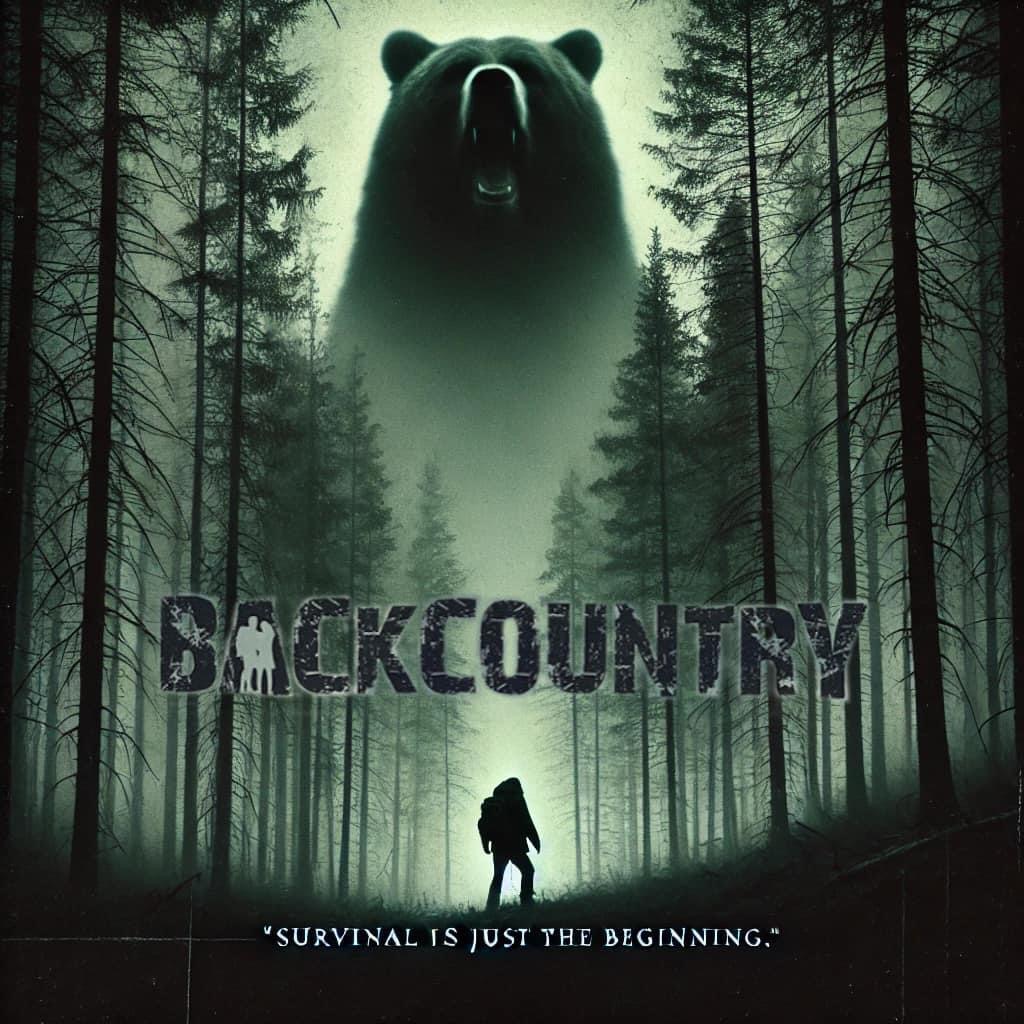
“Backcountry” (2014) – In-Depth Review
Directed by: Adam MacDonald
Written by: Adam MacDonald
Starring: Missy Peregrym, Jeff Roop, Eric Balfour
Plot Summary:
“Backcountry” is a survival horror-thriller that follows Alex (Jeff Roop) and Jenn (Missy Peregrym), a young couple who embark on a camping trip in a remote wilderness. Alex, an experienced outdoorsman, insists on taking Jenn, who is less familiar with the outdoors, on a journey deep into a provincial park in the Canadian wilderness. Confident and dismissive of caution, Alex decides not to bring a map, certain that he knows the area well.
What begins as a relaxing escape into nature quickly turns into a nightmare as they become lost. Their situation worsens when they encounter a black bear, a dangerous predator. As they struggle to find their way back to civilization, they must confront the elements, their growing desperation, and the lurking threat of the bear stalking them. What was meant to be a romantic getaway becomes a harrowing fight for survival.
Suggested videos for you:
Direction and Writing:
Adam MacDonald’s direction in “Backcountry” is tight and efficient, creating an atmosphere of growing tension and dread. The film is a slow-burner, focusing initially on the dynamic between Alex and Jenn as they venture into the woods. MacDonald’s decision to let the suspense build gradually works well in creating a believable and relatable situation. At first, the tension stems from the friction between the couple and their environment, with hints of the underlying dangers waiting to emerge.
MacDonald’s script is simple but effective, with much of the tension coming from the realistic portrayal of how small mistakes can snowball into life-threatening consequences in the wilderness. The writing emphasizes the psychological and emotional toll that fear, isolation, and the unpredictability of nature can have on individuals. There is no need for excessive dialogue or complex subplots; the film’s focus is on survival, and that singularity of purpose drives the narrative forward with an increasing sense of urgency.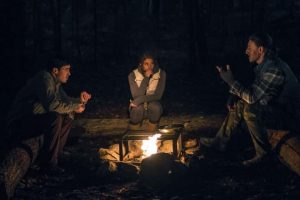
Themes and Symbolism:
At its core, “Backcountry” explores themes of vulnerability, human arrogance, and the raw power of nature. Alex’s overconfidence, especially in refusing to bring a map or take necessary precautions, serves as a reflection of humanity’s tendency to underestimate the forces of nature. His dismissal of Jenn’s concerns early in the film also speaks to the dynamics of gender and control, as Alex assumes a protective and dominant role without considering the consequences of his recklessness.
The bear, a literal predator, also functions as a symbol of nature’s indifference. In the wilderness, human beings are not at the top of the food chain, and the film effectively portrays the terrifying realization that in the wild, survival is not guaranteed. The wilderness itself becomes an antagonist—beautiful and serene at first, but unforgiving and deadly as the film progresses.
There is also a psychological layer to the film, particularly in how the characters deal with fear and helplessness. As they become more lost and vulnerable, their emotions—especially Alex’s guilt and Jenn’s rising anxiety—come to the surface. The emotional unraveling adds another dimension to the physical dangers they face, showing how fear can erode confidence and decision-making.
Performance:
Missy Peregrym’s performance as Jenn is the emotional heart of the film. As the more cautious and inexperienced member of the couple, she 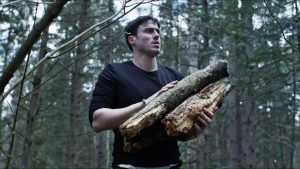 begins the film in a secondary, dependent role, but by the end, she emerges as the true survivor. Peregrym captures Jenn’s growing frustration, fear, and resilience with nuance. Her transformation from a hesitant and passive participant in the trip to a fierce fighter for survival is believable and compelling, and Peregrym’s portrayal of her terror and resourcefulness in the film’s final act is particularly powerful.
begins the film in a secondary, dependent role, but by the end, she emerges as the true survivor. Peregrym captures Jenn’s growing frustration, fear, and resilience with nuance. Her transformation from a hesitant and passive participant in the trip to a fierce fighter for survival is believable and compelling, and Peregrym’s portrayal of her terror and resourcefulness in the film’s final act is particularly powerful.
Jeff Roop plays Alex as a confident but flawed figure. His arrogance and dismissiveness early in the film create tension, especially as it becomes clear that his confidence is misplaced. Roop does a solid job of portraying Alex’s increasing desperation as his facade of control begins to crumble. His journey from confident outdoorsman to a man facing the consequences of his poor decisions adds complexity to his character, although the focus of the film gradually shifts more to Jenn.
Eric Balfour makes a brief but memorable appearance as Brad, a mysterious hiker who adds an extra layer of unease to the couple’s journey. His ambiguous intentions create a sense of threat early in the film, though he isn’t the main antagonist. Balfour’s performance subtly hints at possible danger, playing with the audience’s expectations in a way that contributes to the tension.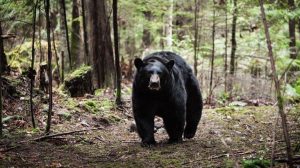
Cinematography and Sound:
Cinematographer Christian Bielz effectively captures the contrast between the beauty and terror of the wilderness. The film’s early scenes present the forest as vast and peaceful, with wide shots that emphasize the couple’s isolation. As the narrative progresses, the camera work becomes tighter and more claustrophobic, heightening the sense of danger and vulnerability as the characters become lost and increasingly desperate.
The scenes involving the bear are shot with a raw, visceral intensity, avoiding excessive CGI or sensationalism. MacDonald smartly opts for realism in these sequences, making the bear attacks brutal and terrifying without feeling exaggerated or forced. The close-up shots during moments of tension, particularly when the bear is near, effectively immerse the audience in the characters’ fear.
The sound design in “Backcountry” plays a crucial role in building suspense. The film uses natural sounds—rustling leaves, snapping twigs, distant animal calls—to create an atmosphere of isolation and unease. The bear’s growls and movement through the forest are often heard before it is seen, making its presence all the more frightening. By keeping much of the horror off-screen, the film allows the audience’s imagination to fill in the blanks, which adds to the tension.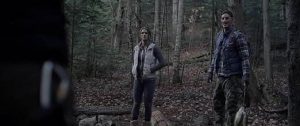
Reception and Legacy:
“Backcountry” received positive reviews from critics and audiences for its realistic portrayal of survival and its tense, slow-building atmosphere. While some viewers felt the film’s pacing was too slow in the first half, the payoff of the bear attack sequences and the psychological tension in the latter half were widely praised. The film was noted for avoiding typical horror movie clichés, instead opting for a grounded, minimalist approach to the survival genre.
In the years since its release, “Backcountry” has become something of a cult favorite among survival horror enthusiasts. Its realistic portrayal of a human versus nature scenario has earned it comparisons to other films like “The Revenant” and “127 Hours,” though “Backcountry” stands out for its focus on a more intimate and personal story.
Analysis:
What makes “Backcountry” a standout in the survival horror genre is its restraint. The film doesn’t rely on gore or over-the-top set pieces to generate fear. Instead, it grounds its horror in reality—the primal fear of being lost and powerless in the face of a deadly predator. The bear, unlike many movie monsters, is a real and ever-present danger, making the threat feel all the more immediate and terrifying.
The film also benefits from its focus on character. The tension between Alex and Jenn is as much a part of the story as their encounter with the bear. Their relationship dynamics—his overconfidence, her hesitations—serve as a mirror for the escalating tension with the wilderness. The film effectively uses their relationship to explore broader themes of trust, survival, and the fragility of human control over nature.
Conclusion:
“Backcountry” is a gripping survival thriller that thrives on atmosphere and realism. It skillfully balances character-driven drama with visceral horror, using the vast, indifferent wilderness as both setting and antagonist. While the first half of the film may be slow for some viewers, the latter half delivers an intense and terrifying survival experience.
Anchored by strong performances, particularly from Missy Peregrym, and a focus on psychological and physical survival, “Backcountry” is a minimalist but highly effective entry in the survival horror genre. Its grounded approach to fear, combined with the raw terror of a bear encounter, ensures that it lingers in the minds of viewers long after the credits roll. For fans of wilderness survival stories, it is a must-see film that explores the unpredictable, unforgiving nature of the wild.









